Medical Center’s 1,000th hospitalized patient with COVID-19 safely discharged home
Just one little dinner.
That’s how 34-year-old Timothy Hudson describes the happenstance that led to a week-long hospitalization with COVID-19, fever spiking at 104 degrees, debilitating body aches, an alarmingly fast heartbeat and spasms of coughing.
“Honestly, I thought I’d be one of the people who has it for a day or two, then it would get better. It didn’t go that way,” said Hudson, a Raleigh resident who travels often in his customer service job for a major food manufacturer.
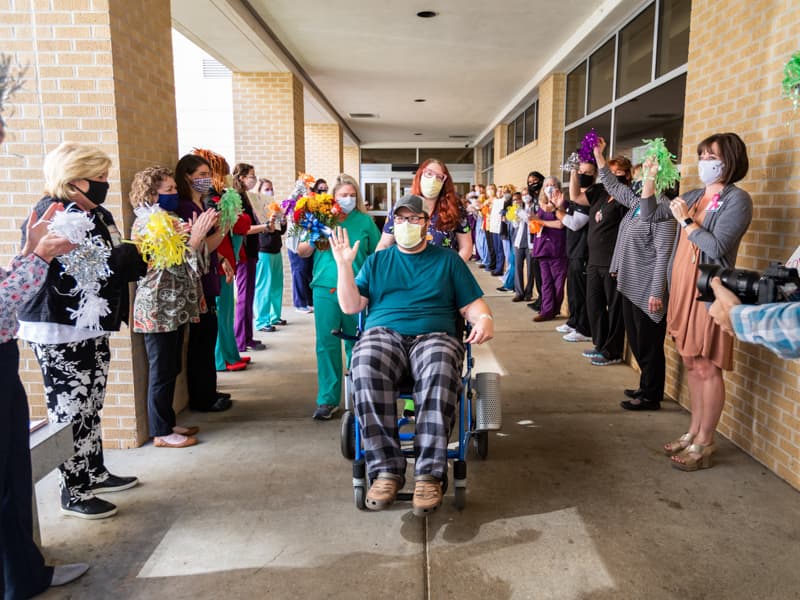
Hudson was discharged today from the University of Mississippi Medical Center, the 1,000th inpatient with COVID-19 cared for at the state’s sole academic medical center. His time at UMMC began in the Emergency Department and resulted in treatment in the medical intensive care unit and a floor of University Hospital reserved for patients with COVID-19.
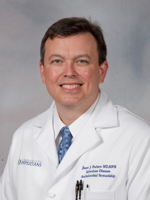
“This goes to show that despite the fact that we’ve had 200 deaths from COVID-19 at the Medical Center, we’ve had 1,000 people safely discharged home,” said Dr. Jason Parham, director of UMMC’s Division of Infectious Diseases.
Hudson believes he can pinpoint when transmission of the virus occurred: at an Oct. 14 business dinner on a trip to Georgia.
“I flew home Thursday, and I woke up Friday feeling extremely exhausted,” Hudson remembered. “I could hardly move. I started hurting all over,” he said. “That lasted for about three hours, and then the fever hit. It didn’t break until three days ago, 102 or 103 the whole time.
“My body felt like it was going to break in half,” he said. “I started having shortness of breath and very bad coughing.”
He got tested on Friday, Oct. 16. It was positive.
He worried about infecting his partner and others around him. “When I got home from my trip, I went straight to my bedroom and locked myself away. My mom came to my window and waved at me,” Hudson said. “I told her, ‘Don’t touch the doors. Don’t come into this house.’
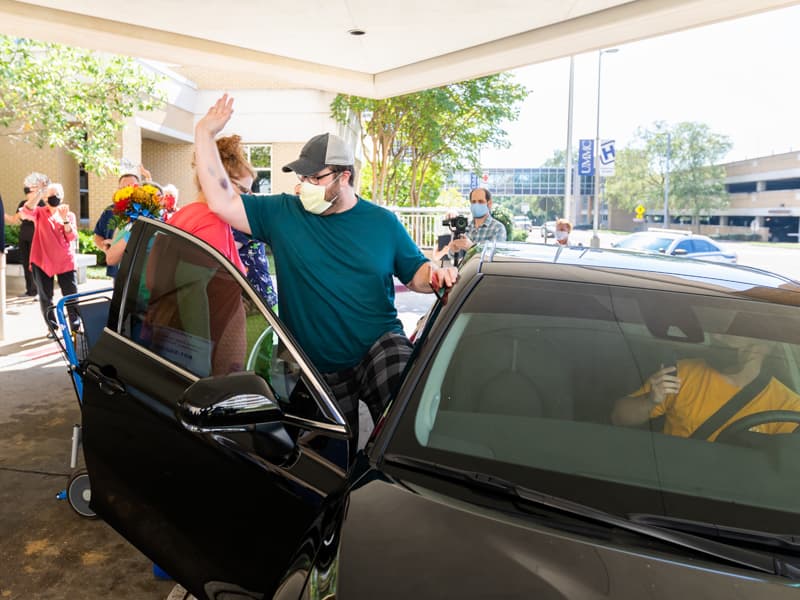
“On Monday morning, my Apple Watch woke me up,” Hudson said. “It told me I was in tachycardia. I looked at my heartbeat, and it was around 176.
“I called for the ambulance.”
A paramedic advised him that, based on his heartbeat, he needed to be transported to a hospital. After being seen at the Emergency Department, Hudson was admitted to the ICU.
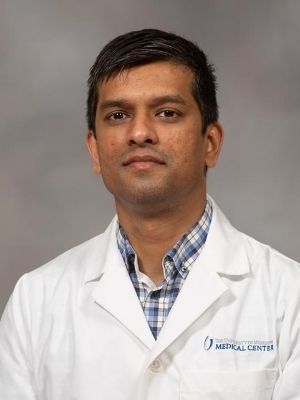
Hudson came to the Medical Center with “classic symptoms of COVID,” said his physician, Dr. Kamir Boodoo, assistant professor of medicine in the Division of Infectious Diseases. “He also had pre-existing comorbidities including obesity. He had persistent high fever, shortness of breath and malaise.”
He spent one night in the ICU before improving enough to be moved to the floor reserved for patients with COVID-19.
“I still wasn’t feeling any better,” Hudson said. “Wednesday night, it was awful. My oxygen dropped and my fever went to 104. That’s when they started Remdesivir.” The antiviral drug earlier this year received emergency FDA approval for use in accelerating the recovery of severely ill hospitalized COVID-19 patients. The medical community is divided on how effective it is.
Boodoo said Hudson also was given dexamethasone, a corticosteroid drug shown in some hospitalized patients to improve outcomes. “We kept these medications going until we felt comfortable that his levels of oxygen and his symptoms had improved,” Boodoo said.
“That seemed to have helped me more than anything had,” Hudson said of the two medications. “The last couple of days, I’ve gotten better, but they say I’m going to be this way for a while. I’m still coughing. I’m very weak.”
What saved him emotionally, he said, was texting with his partner and the care he received from his medical team.
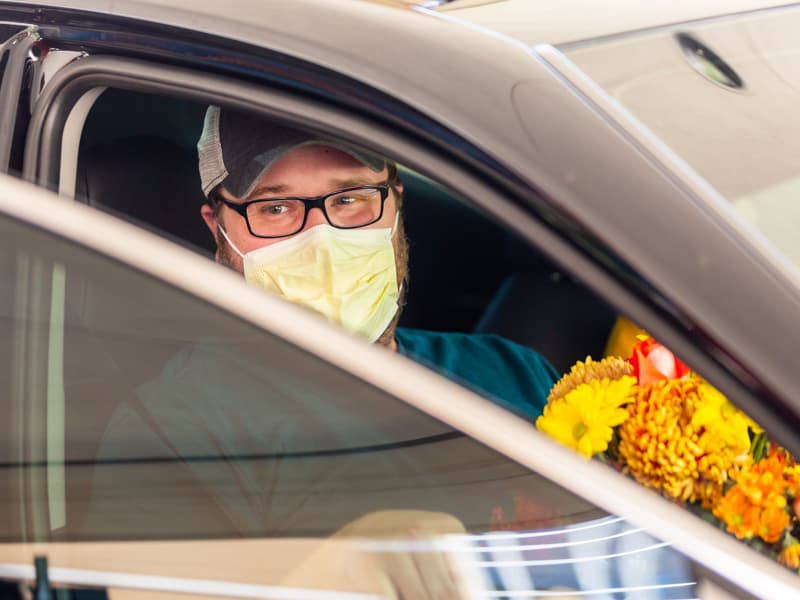
“The nurses have been extremely great. I could not have asked for better,” he said. “You could tell that if they knew I wanted to just chat for a while, they’d listen. The compassion … that has helped me to get through this.”
Although his partner has tested negative for the virus, several others at the dinner tested positive, Hudson said. He wonders if a guest from outside his company who was present at the dinner was responsible for the transmission. “It happened so quickly,” he said.
“You can truly harm a whole bunch of people very fast,” he said. “Some of the people in the group that night are fine, but I wasn’t that fortunate. And I’m in the obese category. I knew that being overweight could put you at higher risk.
“I thought that if I got it, it would just be a few days of not feeling good, and then I’d be right back at it again. I was completely wrong,” Hudson said. “Next time someone says to me not to worry about this virus, I’m going to have a long conversation with them.”
As Hudson was wheeled down a sidewalk to his ride home, dozens of UMMC front-line staff and hospital administrators lined both sides of the walkway, cheering him on and waving signs and pompons.
In addition to the 1,000 hospitalized patients with COVID-19 that have been able to go home, 619 patients with the virus have been treated in UMMC adult and pediatric emergency departments.
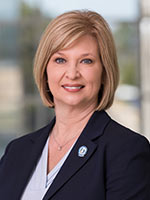
“This is a milestone for the Medical Center as we continue caring for Mississippians with COVID-19,” said Dr. LouAnn Woodward, vice chancellor for health affairs and dean of the School of Medicine. “It’s certainly something to celebrate, for this patient and others who have been able to go home to their families, but also for the care teams doing everything they can to get patients well enough to be discharged.
“It’s also important to remember that this pandemic is not over, and our front line works tirelessly to care for all of the state’s sickest of the sick.”
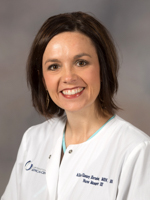
Alice Chaney Herndon is nurse manager of the Medical Center’s mother-baby unit, not on a floor devoted to COVID patients, but she took the time to gather at a safe distance and clap for Hudson as he departed. “We’re celebrating all that we’ve accomplished and learned during this pandemic,” Herndon said. “I’m proud to be a part of this.”
Because he’s still positive for the virus, “they told me I am still infectious and that I need to isolate. The infectious diseases team will keep in contact with me and let me know when it’s safe to be around others. My laundry from the trip to Georgia is still piled up. A lot will have to wait until I’m healed.”
He knows he could have died, and he firmly believes the virus is not “turning a corner. We are just getting back started again.
“It’s not OK to downplay this,” Hudson said. “That attitude kills people.”


